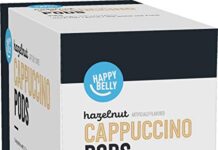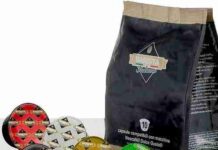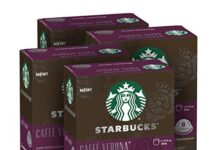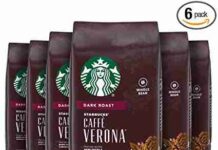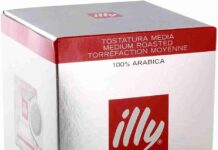We’ve compiled a list of the best organic coffee brands for you to try.
Whether you’re looking for an everyday espresso or want something with more flavor, there’s a brand out there that will meet your needs.
Be sure to read reviews on sites like ours before making any purchases to be confident in what beans are going into your cup.
In addition, if it sounds too good to be accurate and they have prices that seem too low – then it probably is!
Best Organic Coffee for 2024
Are you a coffee enthusiast who values both the taste and ethical considerations of your daily brew?
If so, you’ll be delighted to discover the top 7 best organic coffee brands of 2024.
In this article, we’ll explore the world of organic coffee, why it has gained popularity, and how to choose the best organic coffee brand for your needs.
Additionally, we’ll delve into mycotoxin-free organic coffee, where to purchase these ethical options, and much more.
Finally, we hope this article has helped demystify some common questions about organic coffee and the process behind selecting the best beans”.
Mavericks Low Acid Coffee Review
Maverickslow-acid coffee is produced from organic coffee beans.
It does not include chemicals and additives and is ninety percent less chlorogenic than regular coffee, which means no heartburn.
This coffee is roasted at a specific temperature to decrease chlorogenic acid.
The coffee is remarkable for people suffering from IBS, GERD, and people with a sensitive digestive system.
People on a keto alkaline diet can like a rich cup of bulletproof coffee with Mavericks coffee roast.
The slow roasting process gives this coffee a perfect taste and a delightful and sweet aroma. It is made in America, which is the best standard.
Peru Approcassi Cajamarca Beans Review
The beans are shipped in the afternoon. You will get a fresh coffee bean bag with a standard and fantastic taste.
This coffee has a nutty and rich taste to it. You can use the coffee beans for any coffee, such as a new press, drip, espresso, or vacuum.
The beans are also custom roasted, or you can roast the green beans at house according to your preference. Try a cup today and flavor the excellence.
Colombian Sierra Nevada Magdalena Review
The SMBC, RFA, and Magdalena Finca Agroberlin coffee beans are chemical-free.
You can roast the green beans according to your preference and style and store them in a sealed container.
The grinder will grind the beans well if the beans are roasted correctly.
Colombian SMBC coffee beans come in light roast, da:rk roast, medium roast, and unroasted green beans.
A processing technique makes the coffee wherein the beans are extracted from the pulp before drying.
The wet processing needs specific equipment and a sufficient amount of water.
What Is Organic Coffee and Why Is It Popular?
Understanding the Organic Coffee Phenomenon
Organic coffee is grown using methods and materials with a low environmental impact. It is typically produced without synthetic pesticides or fertilizers, promoting the soil’s and surrounding ecosystems’ health. The organic coffee phenomenon has gained traction due to increasing consumer awareness about sustainable and eco-friendly practices in the food and beverage industry.
Benefits of Choosing Organic Coffee
Opting for organic coffee comes with a myriad of benefits. Firstly, it supports environmentally friendly practices and promotes biodiversity. Additionally, it ensures that farmers and workers are not exposed to harmful chemicals, contributing to their well-being. Moreover, organic coffee is often of high quality, providing consumers with a delicious and pure coffee experience.
How Does Organic Coffee Differ from Conventional Coffee?
Compared to conventional coffee, organic coffee is cultivated without synthetic chemicals. This results in a coffee bean free from potentially harmful residues and exhibits a clean, natural flavor profile. The sustainable farming practices producing organic coffee also contribute to its distinction from conventional counterparts.
How do you choose the best organic coffee brand?
Factors to Consider When Selecting an Organic Coffee Brand
When choosing an organic coffee brand, several factors should be considered. These include the brand’s commitment to sustainability, the sourcing of its coffee beans, and the transparency of its production process. Evaluating these aspects can guide you toward selecting a reputable and ethical organic coffee brand.
Top 7 Criteria for Evaluating Organic Coffee Brands
As a discerning consumer, consider criteria such as the coffee bean’s origin, roasting techniques, flavor profiles, certifications, fair trade practices, and customer reviews when evaluating organic coffee brands. This comprehensive assessment can help you identify a brand that aligns with your values and delivers exceptional coffee products.
Necessary Certifications for Organic Coffee Brands
Certifications play a crucial role when seeking the best organic coffee brand. Look for USDA Organic, Fair Trade Certified, and other recognized organic certifications to ensure the brand adheres to stringent organic standards and promotes fair trade practices.
Exploring the 7 Best Organic Coffee Brands of 2024
Understanding Mycotoxin-Free Organic Coffee
What Are Mycotoxins and Their Impact on Coffee?
Mycotoxins are harmful compounds produced by certain molds that can contaminate food, including coffee. When consumed, mycotoxins can pose health risks to individuals. Mycotoxin-free organic coffee ensures these toxic substances are absent, providing a safe and healthy coffee choice.
Benefits of Choosing Mycotoxin-Free Coffee Brands
Opting for mycotoxin-free coffee brands safeguards your health and guarantees a pure and untainted coffee experience. These brands undergo stringent testing to certify the absence of mycotoxins, offering consumers peace of mind with every sip.
Options for Purchasing Mycotoxin-Free Organic Coffee
Several reputable coffee brands specialize in mycotoxin-free organic coffee, ensuring consumers access to safe, high-quality coffee options. These brands are dedicated to upholding rigorous standards and delivering exceptional mycotoxin-free coffee products.
Where to Buy the Best Organic Coffee Brands
Exploring Online Retailers for Organic Coffee Purchases
Online retailers offer a convenient platform for purchasing the best organic coffee brands. Through e-commerce, coffee enthusiasts can explore a wide selection of organic coffee products and deliver them directly to their doorstep.
Local Stores and Cafes Offering a Variety of Organic Coffee Brands
Local stores and cafes are hubs for discovering and savoring diverse organic coffee brands. By supporting local businesses, consumers contribute to the growth of sustainable and ethical coffee practices within their community.
Directly Purchasing from Coffee Roasters and Producers
Directly purchasing from coffee roasters and producers allow consumers to establish a direct connection with the source of their coffee. This direct trade approach fosters transparency and enables coffee enthusiasts to support ethical coffee farming practices.
Coffee Bean: Top 5 Best Coffee Beans 2024 (NEW)
Cafédirect Machu Picchu Organic Fairtrade Ground Arabica Coffee 227g (Pack of 6)
Clipper Latin American Organic Instant Coffee 100 g (Pack of 6)
Spiller & Tait Signature Blend Coffee Beans - 1kg Bag - Multi Award Winning Roasted in Small Batches in the UK - Espresso Blend Suitable for All Coffee Machines
Kenco Rappor Instant Coffee Granules 750g Medium Roast with a Full Fresh Taste
Coffee Masters Swiss Water Decaffeinated Cafetiere - 500g - Great Taste Award Winner 2019
Coffee Beans - 100% Arabica Blend traditionally Made in Italy (1kg 1xbag)
Union Hand-Roasted Balcones Especial Peru Coffee Beans 1kg
Coffee Masters Peruvian Coffee Beans 1kg - Organic Fairtrade Single Origin Arabica Coffee Beans Roasted in The UK - Ideal for Espresso Machines - Great Taste Award Winner 2018
Der-Franz - Crema Organic Coffee UTZ, Whole Bean, 1000 g
Organic Taster Pack: 100 Nespresso Compatible Pods from Real Coffee
Q: What is organic coffee?
A: Organic coffee is grown without synthetic pesticides, herbicides, or fertilizers. It is produced using sustainable farming practices that promote environmental conservation and the well-being of coffee farmers.
Q: What are the benefits of drinking organic coffee?
A: Drinking organic coffee can reduce exposure to harmful chemicals, promote environmental sustainability, support fair trade practices, and offer a richer and more flavorful coffee experience.
Q: How can I identify organic coffee brands?
A: Look for labels that indicate “certified organic” or “USDA organic.” These certifications ensure that the coffee has been produced according to strict organic standards and has undergone rigorous testing for quality and purity.
Q: What are some popular organic coffee brands?
A: Some popular organic coffee brands include Lifeboost Coffee, Purity Coffee, Kicking Horse Coffee, and others that offer a range of delicious and ethical options for coffee enthusiasts.
Q: Is organic coffee available in different forms?
A: Yes, organic coffee is available in various forms, such as whole bean, ground coffee, instant coffee, roast coffee, decaffeinated organic, and more, catering to different preferences and brewing methods.
Q: What is fair trade organic coffee?
A: Fair trade organic coffee ensures that the coffee farmers receive fair compensation for their work and access better working conditions. It promotes social and economic sustainability within the coffee industry.
Q: How should organic coffee be stored?
A: To maintain the freshness and flavor of organic coffee, it should be stored in an airtight container away from direct sunlight and moisture. For the best results, whole-bean coffee should be ground just before brewing.
Q: Can organic coffee be brewed using different methods?
A: Yes, organic coffee can be brewed using various methods such as drip, French press, pour-over, espresso, and cold brew, allowing coffee drinkers to enjoy their preferred brewing technique.
Q: Are there any decaf options available for organic coffee?
A: Decaffeinated organic options are available for those who prefer to enjoy organic coffee without caffeine. These decaf options are produced using methods that preserve the natural flavors of the coffee beans.
Q: What is the difference between organic coffee and conventional coffee?
A: The main difference lies in the farming practices and the absence of synthetic chemicals in organic coffee production. Organic coffee is often sourced through fair trade, promoting ethical and sustainable coffee production.

























